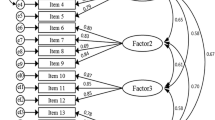Abstract
The purpose of this study was to evaluate the psychometric characteristics of a revised version of the Psychological General Well-Being Index (PGWB), the PGWB-R, using a standardized response option suitable for use in telephone surveys. Sixty patients (42 women and 18 men) from two gastroenterology specialty clinics participated in the study. Patients were administered the PGWB or PGWB-R and the Gastrointestinal Symptom Rating Scale (GSRS) by telephone or face-to-face interview. Internal consistency reliability levels of the PGWB and PGWB-R were comparable, with Cronbach's alpha coefficients between 0.93–0.96 for the total scale across method of administration. Intraclass correlations between the two methods were high (0.66–0.84). Pearson correlations between the GSRS and the PGWB and PGWB-R were similar to one another and to coefficients reported in the literature. Results suggest the PGWB-R may be useful for studies requiring telephone interviews.
Similar content being viewed by others
References
DupuyH. The Psychological General Well-Being (PGWB) Index. In: NKWenger, MEMattson, CDFurberg, JElinson, eds. Assessment of quality of life in clinical trials of cardiovascular therapies Greenwich, Conn: Le Jacq Publishing, Inc, 1984; 170–183: 353–356.
NaughtonMJ, WiklundI. A critical review of dimension-specific measures of health-related quality of life in cross-cultural research. Qual Life Res 1993; 2: 397–432.
DimenäsE, GlisH, HallerbäcB, HernqvistH, SvedlundJ, WiklundI. Quality of life in patients with upper gastrointestinal symptoms: An improved evaluation of treatment regimens? Scand J Gastroenterol 1993; 28: 681–687.
GliseH. Quality of life assessments in patients with peptic ulcer during treatment and follow-up. Scand J Gastroenterol 1993; 28(Suppl 199): 34–35.
WareJ, BrookR, Davies-AveryA, et al. Conceptualization and Measurement of Health Status for Adults in the Health Insurance Study. Vol. I. Model of Health and Methodology. Santa Monica, CA: Rand, 1980.
WareJ, JohnstonS, Davies-AveryA, et al. Conceptualization and Measurement of Health Status for Adults in the Health Insurance Study. Vol. I. Model of Health and Methodology. Santa Monica, CA: Rand, 1979.
CroogS, LevineS, TestaM, et al. The effects of antihypertensive therapy on the quality of life. N Engl J Med 1986; 314: 1657–1664.
LevineS, CroogS, SudilovskyA, TestaM. Effects of antihypertensive medications on vitality and well-being. J Fam Pract 1987; 25(4): 357–363.
RevickiDA, AllenH, BungayK, et al. Responsiveness and calibration of the general well-being adjustment scale in patients with hypertension. J Clin Epidemiol 1994; 47: 1333–1342.
TestaMA, AndersonRB, NackleyJF, Hollenberg and the Quality-of-Life Hypertension Study Group. Quality of life and antihypertensive therapy in men: A comparison of captopril with enalapril. N Engl J Med 1993; 328: 907–913.
HallerbäckB. Assessment of quality of life among patients with suspected duodenal ulcer. Scand J Gastroenterol 1993; 28(Suppl 199): 32–33.
WiklundI. Aspects of quality of life in gastrointestinal disease: Some methodological issues. Scand J Gastroenterol 1995; 30(Suppl 208): 129–132.
WareJ, et al. SF-36 Survey: Manual and Interpretation Guide. Boston: The Health Institute, New England Medical Center, 1993.
CronbachL. Coefficient alpha and the internal structure of tests. Psychometrika 1951; 16(3): 297–334.
FeldtL. A test of the hypothesis that Cronbach's alpha or Kuder-Richardson coefficient twenty is the same for two tests. Psychometrika, 1969; 34(3): 363–373.
FeldtL. A test of the hypothesis that Cronbach's alpha reliability coefficient is the same for two tests administered to the same sample. Psychometrika 1980; 45(1): 99–105.
FeldtL, WoodruffD, SalihF. Statistical inference for coefficient alpha. Appl Psychol Measmt 1987; 11(1): 93–103.
BartkoJ. The intraclass correlation coefficient as a measure of reliability. Psychol Rep 1966; 19: 3–11.
DeyoR, DiehrP, PatrickD. Reproducibility and responsiveness of health status measures: Statistics and strategies for evaluation. Control Clin Trials 1991; 12(4): 142S–158S.
GlassG, StanleyJ. Stat Methods Edu Psychol New Jersey: Prentice-Hall, 1970.
NunnallyJC. Psychometric Theory (2nd ed). New York: McGraw-Hill, 1978.
WiklundI, HallingK, LångströmG. The Psychological General Well-Being Index, a reliable tool for use in cross-cultural multi-center clinical trials. Qual Life Res 1995; 4(5): 503.
ChangS, FineR, SiegelD, ChesneyM, BlackD, HulleyS. The impact of diuretic therapy on reported sexual function. Arch Intern Med 1991; 151: 2402–2408.
FletcherA, BulpittC, ChaseD, CollinsW, FurbergC, GogginT, HewettA, NeissA. Quality of life with three antihypertensive treatments: Cilazapril, atenolol, nifedipine. Hypertension 1992; 19: 499–507.
WalleP, WestergrenG, DimenäsE, OlofssonB, AlbrektsenT. Effects of 100 mg of controlled-released metoprolol and 100 mg of atenolol on blood pressure, central nervous system-related symptoms, and general well being. J Clin Pharmacol 1994; 34: 742–747.
McGauleyG. Quality of life assessment before and after growth hormone treatment in adults with growth hormone deficiency. Acta Paediatr Scand 1989; 356: 70–72.
Author information
Authors and Affiliations
Additional information
Financial support for this study was provided by Astra-Merck.
Rights and permissions
About this article
Cite this article
Revicki, D.A., Leidy, N.K. & Howland, L. Evaluating the psychometric characteristics of the Psychological General Well-Being Index with a new response scale. Qual Life Res 5, 419–425 (1996). https://doi.org/10.1007/BF00449916
Received:
Accepted:
Issue Date:
DOI: https://doi.org/10.1007/BF00449916




